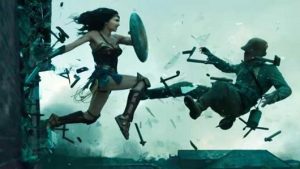Appropriately, it was Once Upon A Time In Hollywood, a movie which celebrates a bygone era of film-making, that won big at the 77th annual Golden Globes awards last night, taking home three Globes in major categories. In many ways, the ghost of Hollywood Past was haunting the tired, slow-paced ceremony, which saw a mostly white and male ensemble of winners take the stage, during an event that felt unfocused and uninspired, barely held together by comedian Ricky Gervais, who looked bored to be hosting one of the most important events in the entertainment industry, and whose attempts to keep the audience’s attention off world politics felt sadly misguided.
Thankfully, his plea for political neutrality was steadfastly ignored by the majority of winners, many of whom took the stage to deliver impassioned speeches addressing a number of notable issues: from Best Actress In A Mini-Series Michelle Williams calling upon women to exercise their right to choose, Best Supporting Actress In A Series Patricia Arquette using her brief time onstage to demand that viewers vote in the 2020 U.S. elections, Best Actor In A Drama Motion Picture and animal-rights activist Joaquin Phoenix thanking the Golden Globes for serving an entirely plant-based dinner to the audience (a decision that was apparently met with mixed reactions), Australians Russell Crowe and Cate Blanchett bringing attention to the deadly bush-fires currently raging across the country, and Best Actress In A Musical/Comedy Series Phoebe Waller-Bridge invoking the name of former U.S. President Barack Obama, who just recently included Waller-Bridge’s hit comedy Fleabag on his annual Presidential Favorites list. LGBTQ+ issues were at the forefront during Kate McKinnon and Ellen DeGeneres’ speech to honor the latter’s acceptance of the special Carol Burnett Award.
But in between these brief highlights, the ceremony still appeared outdated and backwards-thinking: outside of female-exclusive categories, women were handed a bare minimum of awards, with Icelandic composer Hildur Guðnadóttir being the exception to the rule, becoming the first solo woman to accept the award. People of color were also suspiciously absent from the proceedings, except as presenters – the exception in this case being Ramy star Ramy Youssef, and comedian Awkwafina, who became the first woman of Asian descent to win the Golden Globe for Best Actress In A Musical/Comedy. Small moments like these help to give the impression that progress is being made in Hollywood, but don’t make up for a list of nominees that is overwhelmingly representative of a long-gone period in Hollywood history – one of Gervais’ few on-point jokes was his callout of the all-male lineup of directing nominees, and his satirical suggestion that soon, Hollywood would go back to simply never hiring women directors: “problem solved”.
Anti-Disney and anti-Netflix sentiment ran strong at the ceremony, which witnessed an embarrassing turn of events for frontrunners Frozen II, The Irishman, Marriage Story and The Two Popes. Disney suffered their biggest loss of the night in the Best Animated Feature Film category, where they had not one, not two, but three nominees – all of which lost out to underdog Missing Link, a clay-mation movie from Laika Studios, in a move so shocking it even startled the Missing Link directors into near-speechlessness. Later, in the Best Original Song category, Disney was once again stunned by the surprise victory of Elton John and Bernie Taupin, who won for their work on “(I’m Gonna) Love Me Again” for Rocketman, beating out two Disney contenders, “Into The Unknown” and “Spirit” (both, admittedly, weak contestants). But Netflix’s film division was the biggest loser of the evening: going into the event, the main competition in both the Best Director For A Motion Picture and Best Drama Motion Picture fields had been The Irishman‘s Martin Scorsese versus Todd Phillips for Joker – but in both categories, it was neither man who took home the coveted prize, as Sam Mendes and war-drama 1917 won both times. That wouldn’t have been so humiliating if Netflix had been able to claim Best Supporting Actor In A Motion Picture (which they lost to Brad Pitt for Once Upon A Time In Hollywood), Actor In A Musical/Comedy Motion Picture (which they lost to Taron Egerton for Rocketman), Actress In A Drama Motion Picture (which they lost to Renée Zellweger for Judy, despite strong competition from Scarlett Johansson), Actor In A Drama Motion Picture (which Joker star Joaquin Phoenix easily won, beating out Adam Driver and Jonathan Pryce), or Screenplay Of A Motion Picture (an award that clearly belonged to either The Irishman or Marriage Story, but went instead to Once Upon A Time In Hollywood). Ultimately, only Laura Dern was able to carve out a small victory for the streaming service, winning the award for Best Supporting Actress In A Motion Picture for her fan-favorite role as a sassy, no-nonsense divorce lawyer in Marriage Story. A small win, but a win nonetheless, and one that Netflix Film desperately needed as they continue to fight against Hollywood bias.
The event should have been high-stakes, especially with the amount of surprises, snubs and gasp-out-loud upsets that occurred, but low-energy humor from the host and presenters, coupled with slow, largely repetitive victories (winners often had to walk absurdly long distances to the stage, and a few nearly got lost weaving through the crowd, making the ceremony move even slower) made the 77th Golden Globes an unmemorable footnote in awards season history. Here’s hoping that the Oscars will repeat last year’s surprisingly effective no-host format, and give us a more rousing, entertaining, and relevant ceremony than the Globes was able to offer.
